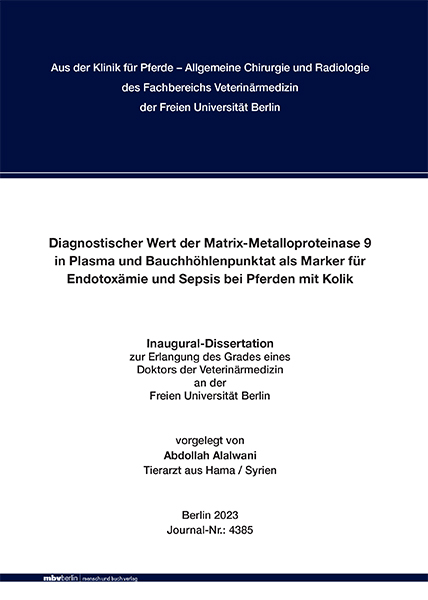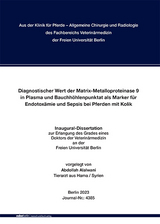Diagnostischer Wert der Matrix-Metalloproteinase 9 in Plasma und Bauchhöhlenpunktat als Marker für Endotoxämie und Sepsis bei Pferden mit Kolik
Seiten
2023
|
1. Auflage
Mensch & Buch (Verlag)
978-3-96729-219-0 (ISBN)
Mensch & Buch (Verlag)
978-3-96729-219-0 (ISBN)
- Keine Verlagsinformationen verfügbar
- Artikel merken
Das Ziel dieser Studie war es, die Konzentrationen von Matrix-Metalloproteinase-9 (MMP-9) in Plasma und Peritonealflüssigkeit von Pferden mit Koliken zu untersuchen und ob der Biomark MMP-9 als Frühmarkter für eine Sepsis oder eine Endotoxämie bei einer Kolik geeignet ist. Die Endotoxämie ist eine der häufigsten Todesursachen bei Pferden mit Koliken. Die Enzymmatrix-Metalloproteinase-9 (MMP-9) ist ein Mitglied der Matrix-Metalloproteinase-Familie, die während der Embryogenese und Wundeheilung eine wichtige Rolle bei der Umgestaltung des Gewebes spielt. Das physiologische Gleichgewicht zwischen Matrix-Metalloproteinase-9 (MMP-9) und ihren Gegenspielern, den tissue inhibitors of metalloproteinases (TIMPs) ist für das Wachstum und die Reparatur von Gewebe erforderlich. Die Störung des Gleichgewichts im Körper und insbesondere im Immunsystem führt zur Überexpression der Matrix-Metalloproteinase-9 (MMP-9).
Es wurden 47 Pferde mit einer Kolik einbezogen, die bei Einlieferung in die Klinik anhand eines modifizierten Sepsis-Scores als endotoxämisch eingestuft wurden. Dieser Score beinhaltete klinische und labordiagnostische Untersuchungen (Allgemeinzustand, Herz- und Atemfrequenz, innere Körpertemperatur, Schleimhautfarbe, weißes Blutbild (WBC) und ionisiertes Calcium.
Unter Verwendung dieses Bewertungssystems wurden Pferde als negativ (n = 32, ≤ 6/15 Punkte), fraglich (n = 8, 7-9 / 15 Punkte) oder positiv (n = 6, ≥ 10/15 Punkte) für Sepsis eingestuft. Die MMP-9-Konzentrationen wurden in Plasma und Peritonealflüssigkeit unter Verwendung speziesspezifischer Sandwich-ELISA-Kits (equine MMP-9 kit (USCN Life Science Inc., China)) bewertet.
Eine signifikante Assoziation der gesamten Sepsis-Bewertung wurde für MMP-9 in der Peritonealflüssigkeit (P= 0,007) mit einem Regressionskoeffizienten von 0,131 gefunden, während für Plasma keine Assoziation gefunden wurde (P= 0,078). Die Verwendung einer MMP-9-Konzentration von > 110 pg/ml in der Peritonealflüssigkeit erwies sich als idealer Grenzwert zur Identifizierung einer positiven Sepsis-Bewertung (≥ 10/15 Punkte) (Sensitivität von 85,7% und Spezifität von 87,5%).
Abschließend wurde festgestellt, dass MMP-9 ein vielversprechender Biomarker mit hohem diagnostischem Wert für Sepsis und Endotoxämie bei Pferdekoliken ist. Die Untersuchung der Peritonealflüssigkeit scheint im Vergleich zum Plasma vorteilhafter zu sein. Da die Abdominozenthese häufig bei der diagnostischen Aufarbeitung von Pferdekoliken durchgeführt wird, wäre ein Schnelltest nützlich, um eine diagnostische Unterstützung bei der Entscheidung für eine weitere Therapie zu haben. Diagnostic value of matrix metalloproteinase 9 in plasma and abdominal punctate as a marker for endotoxemia and sepsis in horses with colic
The aim of this study was to investigate the concentrations of matrix metalloproteinase-9 (MMP-9) in plasma and peritoneal fluid of horses with colic and whether the Biomark MMP-9 is useful as an early marker for sepsis or endotoxemia in colic. Endotoxemia is one of the most common causes of death in horses with colic. Enzyme matrix metalloproteinase-9 (MMP-9) is a member of the matrix metalloproteinase family, which plays an important role in tissue remodeling during embryogenesis and wound healing. The physiological balance between matrix metalloproteinase-9 (MMP-9) and their tissue inhibitors of metalloproteinases (TIMPs) is required for tissue growth and repair. Disturbance of balance in the body and especially the immune system leads to the overexpression of matrix metalloproteinase-9 (MMP-9).
For this reason, 47 horses with colic were examined based on clinical and laboratory diagnostics (general condition, heart and respiratory rate, internal body temperature, mucous membranes, white blood count (WBC) and ionized calcium). Horses with colic were classified as endotoxemic based on a modified sepsis score. Using this scoring system of sepsis, the horses were classified negative (n = 32, ≤ 6/15 points), questionable (n = 8, 7-9 / 15 points) or positive (n = 6, ≥ 10/15 points). MMP-9 concentrations were assessed in the plasma and peritoneal fluid using species-specific sandwich ELISA kits (equine MMP-9 kit (USCN Life Science Inc., China)).
In a linear discriminant analysis, all parameters of the sepsis scoring besides calcium separated well between the severity groups of the sepsis (P<0.05). An association of the sepsis score with matrix metalloproteinase-9 (MMP-9) was significant for peritoneal fluid (P=0.007), with a regression coefficient of 0.131, while no association was found for plasma (P=0.078). The matrix metalloproteinase-9 (MMP-9) concentration of >110 pg/ml in peritoneal fluid proved to be an ideal limit for identifying horses with sepsis (≥ 10/15 points) (sensitivity of 85.7% and specificity of 87.5%).
In conclusion, matrix metalloproteinase-9 (MMP-9) could be a promising biomarker with a high diagnostic value for sepsis and endotoxemia in horses with colic. Examination of peritoneal fluid appears to be more advantageous compared to plasma. Since abdominocentesis is usually performed during the diagnostic work-up of horses with colic, a pen-side assay would be useful to provide a diagnostic support regarding further treatment and prognosis.
Es wurden 47 Pferde mit einer Kolik einbezogen, die bei Einlieferung in die Klinik anhand eines modifizierten Sepsis-Scores als endotoxämisch eingestuft wurden. Dieser Score beinhaltete klinische und labordiagnostische Untersuchungen (Allgemeinzustand, Herz- und Atemfrequenz, innere Körpertemperatur, Schleimhautfarbe, weißes Blutbild (WBC) und ionisiertes Calcium.
Unter Verwendung dieses Bewertungssystems wurden Pferde als negativ (n = 32, ≤ 6/15 Punkte), fraglich (n = 8, 7-9 / 15 Punkte) oder positiv (n = 6, ≥ 10/15 Punkte) für Sepsis eingestuft. Die MMP-9-Konzentrationen wurden in Plasma und Peritonealflüssigkeit unter Verwendung speziesspezifischer Sandwich-ELISA-Kits (equine MMP-9 kit (USCN Life Science Inc., China)) bewertet.
Eine signifikante Assoziation der gesamten Sepsis-Bewertung wurde für MMP-9 in der Peritonealflüssigkeit (P= 0,007) mit einem Regressionskoeffizienten von 0,131 gefunden, während für Plasma keine Assoziation gefunden wurde (P= 0,078). Die Verwendung einer MMP-9-Konzentration von > 110 pg/ml in der Peritonealflüssigkeit erwies sich als idealer Grenzwert zur Identifizierung einer positiven Sepsis-Bewertung (≥ 10/15 Punkte) (Sensitivität von 85,7% und Spezifität von 87,5%).
Abschließend wurde festgestellt, dass MMP-9 ein vielversprechender Biomarker mit hohem diagnostischem Wert für Sepsis und Endotoxämie bei Pferdekoliken ist. Die Untersuchung der Peritonealflüssigkeit scheint im Vergleich zum Plasma vorteilhafter zu sein. Da die Abdominozenthese häufig bei der diagnostischen Aufarbeitung von Pferdekoliken durchgeführt wird, wäre ein Schnelltest nützlich, um eine diagnostische Unterstützung bei der Entscheidung für eine weitere Therapie zu haben. Diagnostic value of matrix metalloproteinase 9 in plasma and abdominal punctate as a marker for endotoxemia and sepsis in horses with colic
The aim of this study was to investigate the concentrations of matrix metalloproteinase-9 (MMP-9) in plasma and peritoneal fluid of horses with colic and whether the Biomark MMP-9 is useful as an early marker for sepsis or endotoxemia in colic. Endotoxemia is one of the most common causes of death in horses with colic. Enzyme matrix metalloproteinase-9 (MMP-9) is a member of the matrix metalloproteinase family, which plays an important role in tissue remodeling during embryogenesis and wound healing. The physiological balance between matrix metalloproteinase-9 (MMP-9) and their tissue inhibitors of metalloproteinases (TIMPs) is required for tissue growth and repair. Disturbance of balance in the body and especially the immune system leads to the overexpression of matrix metalloproteinase-9 (MMP-9).
For this reason, 47 horses with colic were examined based on clinical and laboratory diagnostics (general condition, heart and respiratory rate, internal body temperature, mucous membranes, white blood count (WBC) and ionized calcium). Horses with colic were classified as endotoxemic based on a modified sepsis score. Using this scoring system of sepsis, the horses were classified negative (n = 32, ≤ 6/15 points), questionable (n = 8, 7-9 / 15 points) or positive (n = 6, ≥ 10/15 points). MMP-9 concentrations were assessed in the plasma and peritoneal fluid using species-specific sandwich ELISA kits (equine MMP-9 kit (USCN Life Science Inc., China)).
In a linear discriminant analysis, all parameters of the sepsis scoring besides calcium separated well between the severity groups of the sepsis (P<0.05). An association of the sepsis score with matrix metalloproteinase-9 (MMP-9) was significant for peritoneal fluid (P=0.007), with a regression coefficient of 0.131, while no association was found for plasma (P=0.078). The matrix metalloproteinase-9 (MMP-9) concentration of >110 pg/ml in peritoneal fluid proved to be an ideal limit for identifying horses with sepsis (≥ 10/15 points) (sensitivity of 85.7% and specificity of 87.5%).
In conclusion, matrix metalloproteinase-9 (MMP-9) could be a promising biomarker with a high diagnostic value for sepsis and endotoxemia in horses with colic. Examination of peritoneal fluid appears to be more advantageous compared to plasma. Since abdominocentesis is usually performed during the diagnostic work-up of horses with colic, a pen-side assay would be useful to provide a diagnostic support regarding further treatment and prognosis.
| Erscheinungsdatum | 19.04.2024 |
|---|---|
| Verlagsort | Berlin |
| Sprache | deutsch |
| Maße | 148 x 210 mm |
| Gewicht | 240 g |
| Themenwelt | Veterinärmedizin ► Allgemein |
| Veterinärmedizin ► Pferd | |
| Schlagworte | biological markers • biologische Marker • Colic • Diagnosetechniken • Diagnostic techniques • endotoxaemia • Endotoxämie • Endotoxine • endotoxins • Entzündung • Horses • inflammation • Kolik • Laboratory Methods • Labormethoden • Matrix-Metalloproteinase 9 • Metalloproteinasen • metalloproteinases • Pferde • Sepsis |
| ISBN-10 | 3-96729-219-3 / 3967292193 |
| ISBN-13 | 978-3-96729-219-0 / 9783967292190 |
| Zustand | Neuware |
| Informationen gemäß Produktsicherheitsverordnung (GPSR) | |
| Haben Sie eine Frage zum Produkt? |

